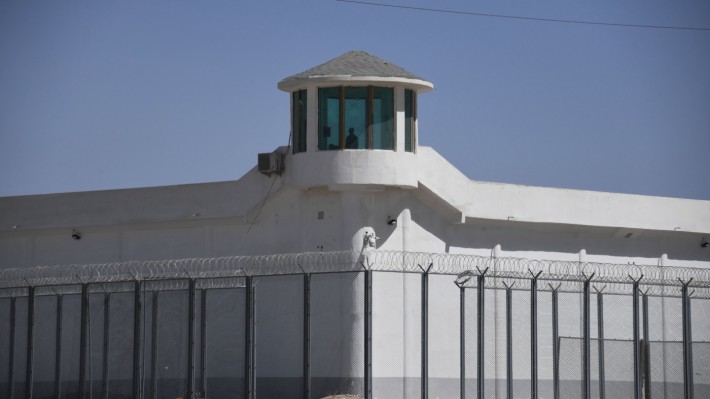Leaked documents reveal brainwashing in China’s prison camps
Documents challenge Beijing’s claims that the camps provide voluntary education

A free daily email with the biggest news stories of the day – and the best features from TheWeek.com
You are now subscribed
Your newsletter sign-up was successful
Leaked documents have exposed the systematic brainwashing of Muslims in China’s network of high-security prison camps.
The Guardian says the papers reveal the “largest mass incarceration of an ethnic-religious minority since the second world war” and show China is running detention camps that are secret, involuntary and used for ideological “education transformation”.
The Chinese government has long claimed the camps, in the far-western Xinjiang region, provide voluntary education and training. China's ambassador to the UK insists that the leaked documents have been fabricated.
The Week
Escape your echo chamber. Get the facts behind the news, plus analysis from multiple perspectives.

Sign up for The Week's Free Newsletters
From our morning news briefing to a weekly Good News Newsletter, get the best of The Week delivered directly to your inbox.
From our morning news briefing to a weekly Good News Newsletter, get the best of The Week delivered directly to your inbox.
However, a nine-page memo by Zhu Hailun, then deputy-secretary of Xinjiang's Communist Party and the region's top security official, orders that the camps should be run as high security prisons, with strict discipline, punishments and no escapes.
The International Consortium of Investigative Journalists found that about a million people - mostly from the Muslim Uighur community - have been detained without trial.
The paperwork rules that these inmates could be held indefinitely, but must serve at least a year in the camps before they can even be considered for “completion”, or release.
Even then, captives will only be released when they can prove they have transformed their behaviour, beliefs and language.
A free daily email with the biggest news stories of the day – and the best features from TheWeek.com
“Promote the repentance and confession of the students for them to understand deeply the illegal, criminal and dangerous nature of their past activity,” says the document.
“For those who harbour vague understandings, negative attitudes or even feelings of resistance…carry out education transformation to ensure that results are achieved.”
Another leaked document reveals that 15,000 people from southern Xinjiang were sent to the camps over the course of just one week in 2017.
Sophie Richardson, the China director at Human Rights Watch, told the BBC the leaked memo should be used by prosecutors.
“This is an actionable piece of evidence, documenting a gross human rights violation,” she said.
“I think it's fair to describe everyone being detained as being subject at least to psychological torture, because they literally don't know how long they're going to be there.”
–––––––––––––––––––––––––––––––For a round-up of the most important stories from around the world - and a concise, refreshing and balanced take on the week’s news agenda - try The Week magazine. Start your trial subscription today –––––––––––––––––––––––––––––––
-
 Why are election experts taking Trump’s midterm threats seriously?
Why are election experts taking Trump’s midterm threats seriously?IN THE SPOTLIGHT As the president muses about polling place deployments and a centralized electoral system aimed at one-party control, lawmakers are taking this administration at its word
-
 ‘Restaurateurs have become millionaires’
‘Restaurateurs have become millionaires’Instant Opinion Opinion, comment and editorials of the day
-
 Earth is rapidly approaching a ‘hothouse’ trajectory of warming
Earth is rapidly approaching a ‘hothouse’ trajectory of warmingThe explainer It may become impossible to fix
-
 Epstein files topple law CEO, roil UK government
Epstein files topple law CEO, roil UK governmentSpeed Read Peter Mandelson, Britain’s former ambassador to the US, is caught up in the scandal
-
 Iran and US prepare to meet after skirmishes
Iran and US prepare to meet after skirmishesSpeed Read The incident comes amid heightened tensions in the Middle East
-
 Israel retrieves final hostage’s body from Gaza
Israel retrieves final hostage’s body from GazaSpeed Read The 24-year-old police officer was killed during the initial Hamas attack
-
 China’s Xi targets top general in growing purge
China’s Xi targets top general in growing purgeSpeed Read Zhang Youxia is being investigated over ‘grave violations’ of the law
-
 Panama and Canada are negotiating over a crucial copper mine
Panama and Canada are negotiating over a crucial copper mineIn the Spotlight Panama is set to make a final decision on the mine this summer
-
 Why Greenland’s natural resources are nearly impossible to mine
Why Greenland’s natural resources are nearly impossible to mineThe Explainer The country’s natural landscape makes the task extremely difficult
-
 Iran cuts internet as protests escalate
Iran cuts internet as protests escalateSpeed Reada Government buildings across the country have been set on fire
-
 US nabs ‘shadow’ tanker claimed by Russia
US nabs ‘shadow’ tanker claimed by RussiaSpeed Read The ship was one of two vessels seized by the US military